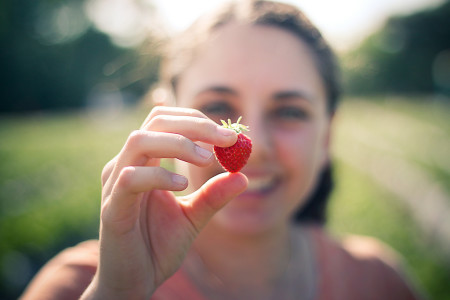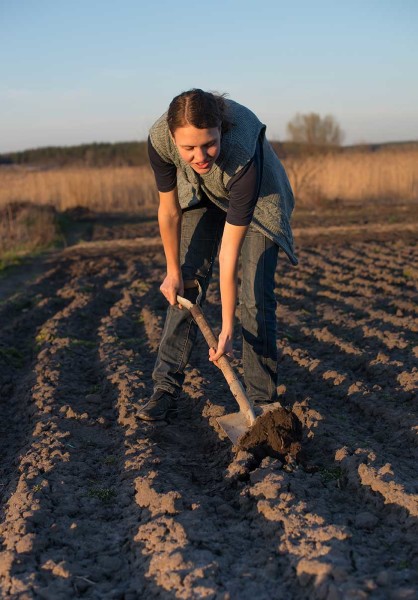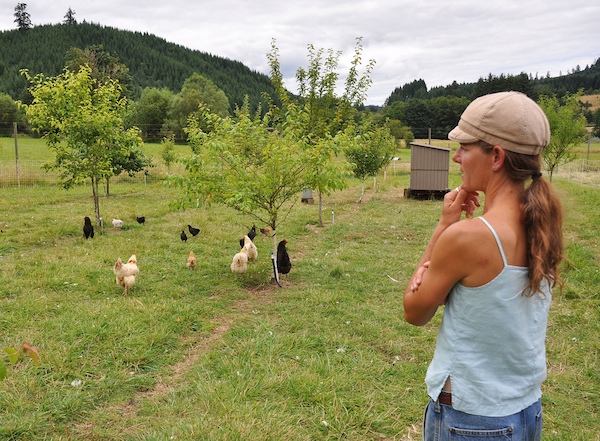You probably know the saying by now: anything a man can do a woman can do better. And usually she does it with less complaining, more style, and let’s be totally honest, a whole lot more grace. Even farming. Yep, the new face of farmers in the U.S. might just pleasantly surprise you.
While farming—especially urban farming—may seem like the uber-hip job du jour, it’s not all kale-growing and rooftop beehives. Most of our food still comes from traditional farmers, those kind people doing the work out in the middle of nowhere. But most of the nation’s farmers are nearing retirement age. Now, not only are younger people taking on farming, but women are stepping up to the challenge, and they’re doing it their way, too (of course)–reinventing the farming model and taking their time with it.
 According to recent USDA data, women make up a growing percentage of the nation’s farmers, about 300,000 of them, and the USDA also notes 1 million total women as “farm operators,” which means running the farm alongside someone else, like a spouse. The number of female farmers has tripled in the last thirty years—up from 5 percent in 1978 to 14 percent in 2007. Today’s female farmers run the gamut from growing specialty crops and grains to raising livestock for meat, dairy and eggs.
According to recent USDA data, women make up a growing percentage of the nation’s farmers, about 300,000 of them, and the USDA also notes 1 million total women as “farm operators,” which means running the farm alongside someone else, like a spouse. The number of female farmers has tripled in the last thirty years—up from 5 percent in 1978 to 14 percent in 2007. Today’s female farmers run the gamut from growing specialty crops and grains to raising livestock for meat, dairy and eggs.
Most female farmers are averaging sales of less than $10,000 a year, with nearly half selling considerably less—about $1,000 worth or less. That’s not a sign that women aren’t good farmers, but perhaps more indicative of their patient approach towards a natural growth process. “These people have other sources of income, or they have an off-farm jobs,” Bob Hoppe, an agricultural economist with USDA’s Economic Research Service who authored the report told NPR. They’re coming from corporate jobs, academic jobs, the medical profession, the art and fashion worlds—and they’re finding that not only does farming feed them and their families, it’s helping to give back to the communities, too.
 With a move towards healthier eating and the increase in the number of farmers markets across the country, small-scale farming has become a booming segment of the farming industry in recent years, growing to more than 30 percent of the farm industry—up from just 11 percent in 1982. But not all female farmers are taking the small or slow approach. According to the USDA, nearly 2,000 female farmers generate sales of at least $1 million annually. (Most of those are running livestock operations though.)
With a move towards healthier eating and the increase in the number of farmers markets across the country, small-scale farming has become a booming segment of the farming industry in recent years, growing to more than 30 percent of the farm industry—up from just 11 percent in 1982. But not all female farmers are taking the small or slow approach. According to the USDA, nearly 2,000 female farmers generate sales of at least $1 million annually. (Most of those are running livestock operations though.)
And if you want to see female farmers in action, the woman to check-in with is Audra Mulkern, founder of the Female Farmer Project, a chronicle of female farmers photographed by Mulkern, who is a cook, writer and photographer, committed to “putting good food in the spotlight and changing the way you look at farming and the food on your plate,” her website explains. From a rooftop in Brooklyn to a dairy farm in Washington, not only does Mulkern photograph the diversity of women in the fields, but she also features guest blog posts on her site written by her subjects.
While we still tend to think bigger is better, when it comes to our food we’re learning that’s not the case. Large-scale farming is harder on the land and often more unmanageable, whereas the small-scale farm can be more easily managed, nurtured. This can also mean fewer chemicals on the crops and in the soil, air and water. Female farmers are embracing a new direction in farming, one that may help us to break away from our corporate mono-culture and big-ag preferences and move towards a healthier, more graceful food system.
 Jill Ettinger is a featured writer on Women Of Green. She is also the senior editor and featured columnist on EcoSalon and sister-site Organic Authority. She is the co-director of Eat Drink Better, and editor for NaturallySavvy. Jill has been featured in The Village Voice, MTV, Reality Sandwich and Global Rhythm, as well as the anthologies Towards 2012: Perspectives on the Next Age (Tarcher/Penguin) and What Do You Believe? (Outside the Box). Jill spent more than a decade as a sales and marketing manager in the natural foods industry and regularly consults with emerging brands and organizations in creative communication, social media and marketing strategies. A focus on food, wellness, fashion, music and world cultural expressions, Jill blends the mystical and modern as she explores what our shifting food, fashion, culture and creative landscapes will look, sound and taste like in the future. For more info, visit www.jillettinger.com. And stay in touch with Jill on Twitter and Instagram.
Jill Ettinger is a featured writer on Women Of Green. She is also the senior editor and featured columnist on EcoSalon and sister-site Organic Authority. She is the co-director of Eat Drink Better, and editor for NaturallySavvy. Jill has been featured in The Village Voice, MTV, Reality Sandwich and Global Rhythm, as well as the anthologies Towards 2012: Perspectives on the Next Age (Tarcher/Penguin) and What Do You Believe? (Outside the Box). Jill spent more than a decade as a sales and marketing manager in the natural foods industry and regularly consults with emerging brands and organizations in creative communication, social media and marketing strategies. A focus on food, wellness, fashion, music and world cultural expressions, Jill blends the mystical and modern as she explores what our shifting food, fashion, culture and creative landscapes will look, sound and taste like in the future. For more info, visit www.jillettinger.com. And stay in touch with Jill on Twitter and Instagram.
